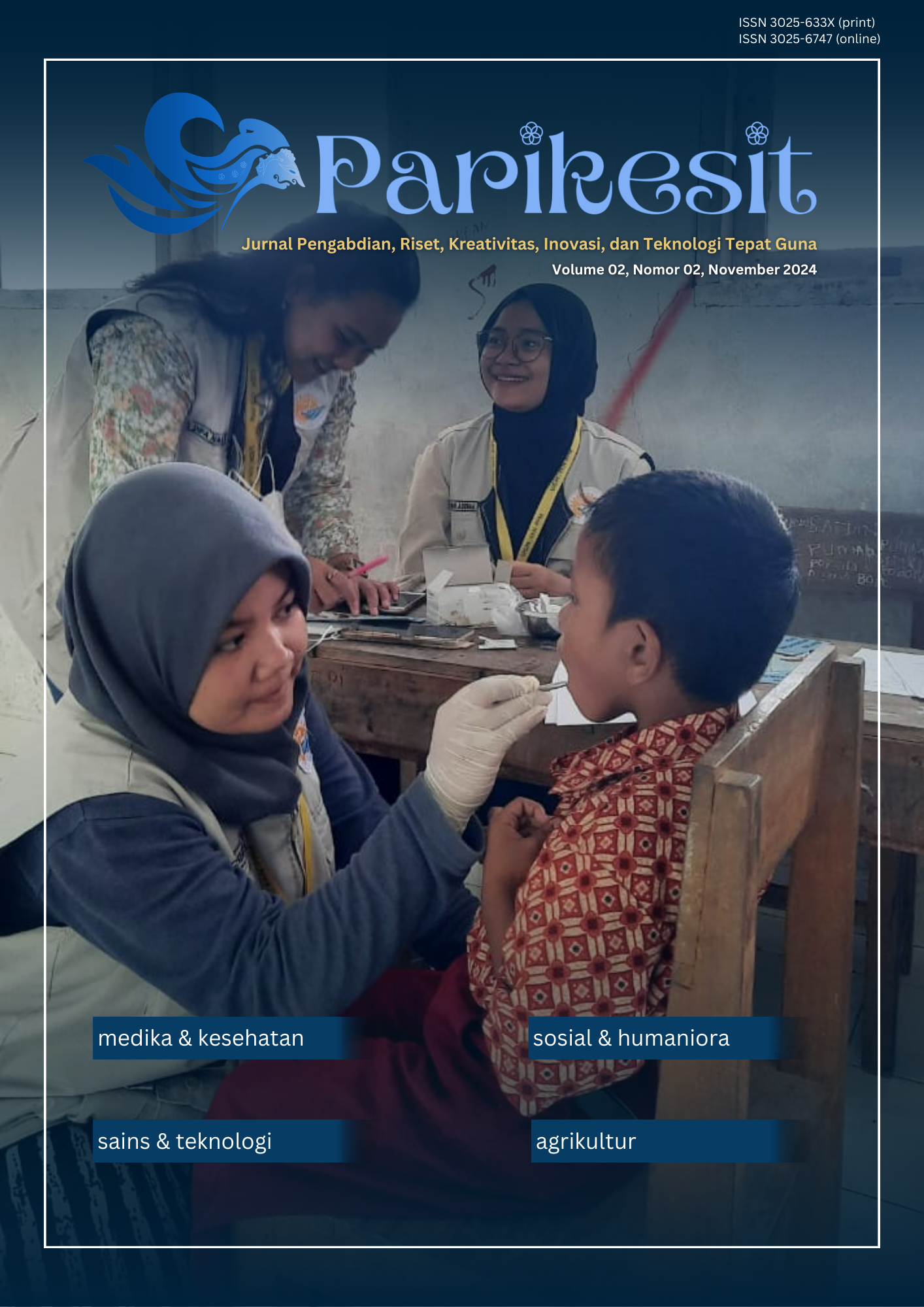Optimization of Sustainable Aquaculture through the Integration of Recirculating Aquaculture System (RAS) and the Development of Maggot Feed in Desa Sumberharjo
Abstract
The vulnerability of aquaculture towards climate change and other environmental factors, forced the industry to adapt and adopt a new technology. Those factors can be minimized through the application of Recirculating Aquaculture System (RAS) that has been proven to have a 90–99% lower rate of water dependency compared to conventional aquaculture systems. Another problem faced by the aquaculture sector is the soaring production costs due to the high price of fish feed. Maggots are rich in protein, which is essential for fish growth, and can be used as a more affordable natural feed. Limited water supply in Desa Sumberharjo poses a significant obstacle to the development of aquaculture. This problem can be solved by utilizing RAS technology to overcome water limitations and developing maggot as an alternative feed to enhance productivity and reduce production costs in fish farming. The methods used in this research and community service are survey and field observation, program socialization, questionnaire, local group formation, alongside community training and assistance. This research and community service aims to address the challenges faced in developing the aquaculture sector in Desa Sumberharjo through the implementation of RAS technology and the development of natural fish feed from maggots.
References
Wibowo, E. T. (2020). Pembangunan Ekonomi Pertanian Digital dalam Mendukung Ketahanan Pangan (Studi di Kabupaten Sleman: Dinas Pertanian, Pangan, dan Perikanan, Daerah Istimewa Yogyakarta). Jurnal Ketahanan Nasional, 26(2), 204–228. https://doi.org/10.22146/jkn.57285
Aidore, A. E., Rumate, V. A., & Rotinsulu, T. O. (2021). Pengaruh kebijakan pemerintah, produksi sektor perikanan dan tingkat pengangguran terhadap pertumbuhan ekonomi dan kemiskinan absolut di kota bitung. Jurnal Pembangunan Ekonomi Dan Keuangan Daerah, 21(1), 17–38.
Subarkah, L. (2023, Agustus 18). Bencana Kekeringan: 31 Hektar Kolam Ikan di Sleman Kekurangan Air. Harian Jogja. https://www.jogjapolitan.harianjogja.com
Ahmed, T., & Turchini, G. M. (2021). Recirculating aquaculture systems (RAS): Environmental solution and climate change adaptation. Journal of Cleaner Production, 297, 1–14. https://doi.org/10.1016/j.jclepro.2021.126604
Aich, N., Nama, S., Biswal, A., & Paul, T. (2020). A review on recirculating aquaculture systems: Challenges and opportunities for sustainable aquaculture. Innovative Farming, 5(1), 17–24.
Yunaidi, Y., Rahmananta, A. P., & Wibowo, A. (2019). Aplikasi pakan pelet buatan untuk peningkatan produktivitas budidaya ikan air tawar di Desa Jerukagung Srumbung Magelang. Jurnal Pemberdayaan: Publikasi Hasil Pengabdian kepada Masyarakat, 3(1), 45–54. https://doi.org/10.12928/jp.v3i1.621
Amelia, F., Andriani, Y., & Haetami, K. (2022). Pemanfaatan tumbuhan sebagai bahan pakan ikan: Sebuah review. Jurnal Ruaya: Jurnal Penelitian Dan Kajian Ilmu Perikanan Dan Kelautan, 10(1), 23–29. https://doi.org/10.29406/jr.v10i1.3360
Marbun, N. G. T., Tafsin, M. R., & Henuk, Y. L. (2021). Efficiency utilization of protein and energy of maggot black soldier fly at different phase on chicks. In: International Conference on Agriculture, Environment and Food Security: Vol. 782. IOP Conference Series: Earth and Environmental Science (pp 022095). IOP Publishing. https://doi.org/doi:10.1088/1755-1315/782/2/022095
Ilmiyah, F., Aidha, S. N., Quorum, I. A., & Zunaidi, A. (2022). Sosialisasi penanggulangan tingginya angka pernikahan dini di Desa Tambakrejo, Wonotirto, Blitar. Jurnal Pengabdian Kepada Masyarakat, 2(2), 29–33. https://doi.org/10.34148/komatika.v2i2.508
Kent, M. L., & Lane, A. (2021). Two-way communication, symmetry, negative spaces, and dialogue. Public Relations Review, 47(2), 1–9. https://doi.org/10.1016/j.pubrev.2021.102014
Ismail, I., & F. P. Al-Bahri. (2019). Perancangan e-kuisioner menggunakan CodeIgniter dan React-Js sebagai tools pendukung penelitian. J-SAKTI: Jurnal Sains Komputer & Informatika, 3(2), 337–347. https://doi.org/10.30645/j-sakti.v3i2.152
Muchlis, M., Christian, A., & Sari, M. P. (2019). Kuesioner online sebagai media feedback terhadap pelayanan akademik pada STMIK Prabumulih. Eksplora Informatika, 8(2), 149–157. https://doi.org/10.30864/eksplora.v8i2.215
Fauzia, S. R., & Suseno, S. H. (2020). Resirkulasi Air untuk Optimalisasi Kualitas Air Budidaya Ikan Nila Nirwana (Oreochromis niloticus). Jurnal Pusat Inovasi Masyarakat, 2(5), 887–892.
Li, H., Cui, Z., Cui, H., Bai, Y., Yin, Z., & Qu, K. (2023). Hazardous substances and their removal in recirculating aquaculture systems: A review. Aquaculture, 569, 1–19. https://doi.org/10.1016/j.aquaculture.2023.739399
Ahmed, T., & Turchini, G. M. (2021). Recirculating aquaculture systems (RAS): Environmental solution and climate change adaptation. Journal of Cleaner Production, 297, 1–14. https://doi.org/10.1016/j.jclepro.2021.126604
Hapsari, A. W., Hutabarat, J., & Harwanto, D. (2020). Aplikasi komposisi filter yang berbeda terhadap kualitas air, pertumbuhan dan kelulushidupan ikan nila (Oreochromis niloticus) pada sistem resirkulasi. Jurnal Sains Akuakultur Tropis, (1), 39–50. https://doi.org/10.14710/sat.v4i1.6437
Jacinda, A. K., Yustiati, A., & Andriani, Y. (2021). Aplikasi teknologi recirculating aquaculture system (RAS) di Indonesia. Jurnal Perikanan dan Kelautan, 11(1), 43–59. https://doi.org/10.33512/jpk.v11i1.11221
Herjayanto, M., Munandar, A., Pratama, G., Syamsunarno, M. B., Yanuarti, R., Ilhamdy, A. F., & Kurniawan, I. D. (2021). Gerakan ketahanan pangan melalui budidaya ikan dalam ember dalam menghadapi pandemik Covid-19 di Desa Kareo, Kabupaten Serang. Journal of Community Empowering and Services, 5(1), 7–13. https://doi.org/10.20961/prima.v5i1.43968
Janna, M., Sijid, S. A., & Pasau, N. S. (2022). Analisis proksimat pakan ikan di Balai Budidaya Air Payau Takalar. Jurnal Mahasiswa Biologi, 2(3), 86–90. https://doi.org/10.24252/filogeni.v2i3.29547
Helmiyati, S., Rustadi, R., Isnansetyo, A., & Zulprizal, Z. (2020). Evaluasi kandungan nutrien dan antinutrien tepung daun kelor terfermentasi sebagai bahan baku pakan ikan. Jurnal Perikanan Universitas Gadjah Mada, 22(2), 149–158. https://doi.org/10.22146/jfs.58526
Ali, N. Y. I., & Sa’diyah, K. (2024). Pengaruh rasio tepung tapioka terhadap kualitas pakan ikan lele. Jurnal Teknologi Separasi, 10(1), 279–286. https://doi.org/10.33795/distilat.v10i1.4888
Copyright (c) 2024 Jurnal Pengabdian, Riset, Kreativitas, Inovasi, dan Teknologi Tepat Guna

This work is licensed under a Creative Commons Attribution-ShareAlike 4.0 International License.




